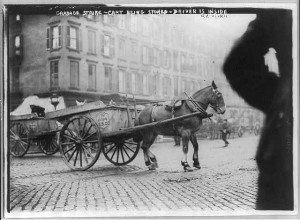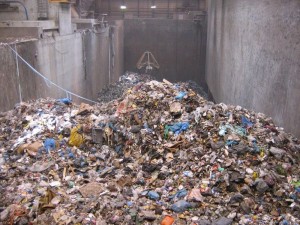I had no idea that the New York Department of Sanitation had an Anthropologist-in-Residence until I came across a smart interview that Alex Carp did with Robin Nagle in The Believer. Nagle, also an NYU professor, has championed the building of a Museum of Sanitation in NYC and wants people to think about something they’d rather quickly toss away: trash. And she also wants the public to respect the important role that sanitation workers play in our lives. An excerpt from the interview:
“The Believer: It seems garbage collection might present this weird moment where, on one hand, you have all of these metaphors and figurative meanings that people react to when they think of garbage, but you also have this very real person, driving the truck and collecting the bins—you, when you’ve been out working with DSNY—just doing her job.
Robin Nagle: Very much so. One of the categories of garbage has its own word in New York City, but it’s a category found everywhere that there is trash. There are things people will put out for discard: they’re done with it, they don’t want to see it again. Somebody else looks at that same object and says, ‘Whoa, wait a minute. That’s pretty nice. I want to keep that.’ Those two chairs you’re sitting in were on the curb to be thrown out. They’re pretty nice chairs. I’m happy to have them. In New York, that’s called mongo. It’s a noun and a verb: those are mongo. People who take things from the trash to keep are mongoing.
Which, by the way, is illegal. You’re not supposed to do it, just for the record.
Then I’m also looking at—when I’m on the street wearing my uniform, for example, and when I’m working with people who have worn that uniform for a decade or two decades or longer… What do they put on with the uniform that they don’t necessarily choose to wear, but that the public puts on them? Because there is the stigma of being a sanitation worker and picking up garbage every day…People assume they have low IQs; people assume they’re fake mafiosi, wannabe gangsters; people assume they’re disrespectable. Unlike, say, a cop or a firefighter. And I do believe very strongly it’s the most important uniformed force on the street, because New York City couldn’t be what we are if sanitation wasn’t out there every day doing the job pretty well….
And the health problems that sanitation’s solved by being out there are very, very real, and we get to forget about them. We don’t live with dysentery and yellow fever and scarlet fever and smallpox and cholera, those horrific diseases that came through in waves. People were out of their minds with terror when these things came through. And one of the ways that the problem was solved—there were several—but one of the most important was to clean the streets. Instances of communicable and preventable diseases dropped precipitously once the streets were cleaned. Childhood diseases that didn’t need to kill children, but did. New York had the highest infant mortality rates in the world for a long time in the middle of the nineteenth century. Those rates dropped. Life expectancy rose. When we cleaned the streets! It seems so simple, but it was never well done until the 1890s, when there was this very dramatic transformation.”
Tags: Alex Carp, Robin Nagle


